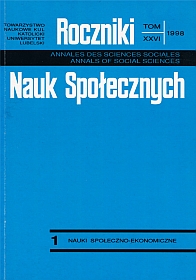Jana Pawła II prakseologia pokoju
Abstrakt
To prevent wars and to build peace is the political necessity of our times, an ethical imperative, on which not only the future of particular countries and nations depends, but also of the whole of humankind. Contemporary studies on peace seek to work out a general theory of peace on the basis of the empirical research on the socio-political reality. They seek to work out models and patterns of a peaceful society and concrete hints for the politicians and institutions responsible for the construction of the socio-political order. In his social teaching, John Paul II takes up similar efforts to formulate concrete directives for action on behalf of world peace. It follows from his teaching that lasting peace, that is, a peace that goes beyond common co-existence and requires a solidary international cooperation on behalf of development, cessation of the arms race, gradual and balanced disarmament, respect for human rights and dignity, respect for the inalienable rights of the nations, education for peace and a constant dialogue amidst tension, disputes and conflicts. John Paul II's proposals for the construction of a lasting peace seem to a great extent correspond with the achievements of the contemporary research on peace. It may happen so that not everybody is persuaded by the theological character in which he seeks to justify the actions he proposes. The paper deliberately omits this problem. Nevertheless, the programme of measures proposed by the Pope should be regarded as an important contribution to the reflection on the ways in which to secure a lasting peace for the world. The programme has a profoundly humanistic dimension, the fact which makes it plausible to be accepted not only by the people who are governed by religious principles in their lives, but also by those who care about peace and seek to secure it permanently.
Copyright (c) 1998 Roczniki Nauk Społecznych

Utwór dostępny jest na licencji Creative Commons Uznanie autorstwa – Użycie niekomercyjne – Bez utworów zależnych 4.0 Międzynarodowe.


